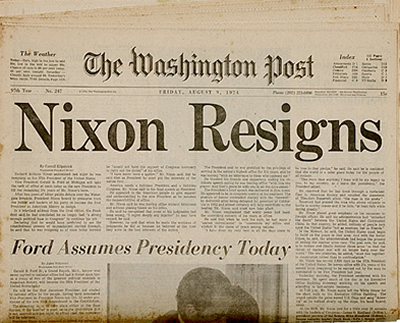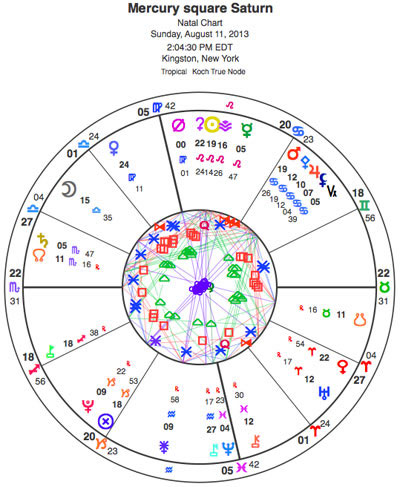
The Washington Post: An American Story
Dear Friend and Reader:
Just hours before the Leo New Moon, the owners of The Washington Post announced that they had sold the paper to Jeff Bezos, the billionaire founder of Amazon.com.
While everyone said they were shocked, The Post had been struggling, and seeking a buyer, for a while. Nobody could be that surprised that the money to buy the paper came from the industry that has all but swallowed print media -- the Internet.
 |
The historical development that The Washington Post helped create -- the resignation of Richard Nixon, after 18 months of relentless coverage of Watergate by Woodward and Bernstein. |
Meyer had served as chairman of the Federal Reserve from 1930-1933, and then served as the first president of the World Bank Group -- that is, the World Bank. So the 80-year history of Meyer-Graham control of the paper begins with an investment by someone who could legitimately be called part of the global elite.
What is interesting is that the paper became one of the liberal bastions of American journalism, and was sometimes referred to as "Pravda on the Potomac." FBI big boss J. Edgar Hoover said he never read the thing, because it reminded him of Worker's World, a socialist newspaper.
Meyer restored the paper to vitality and served as its publisher until 1946, when he was appointed as president of the World Bank. He passed the reins to his son-in-law, Philip Graham. He was a striking and charismatic figure inside the Beltway, and a successful businessman, expanding the newspaper's holdings vastly. And he was a symbol of the new young elite of the early 1960s, the Camelot era.
As he grew older, however, Graham developed mental illness. In her memoir, his widow Katharine Graham said that her husband drank heavily and lapsed into periods of depression, and also suffered severe manic episodes. He was in and out of mental hospitals. During one hospital stay in August 1963, he convinced his doctors to let him take a break. He went home and shot himself with a .28-gauge shotgun.
 |
Katharine Graham, member of the global elite who did not act like one. Photo courtesy of The Washington Post. |
Katharine Graham was not an extrovert or anyone with the inherent desire to lead a company, much less be in a position of national authority. But she overcame her anxieties and, with trust in the paper's editors, she led the newspaper through its most important phase in the early 1970s.
She had the guts to incur the wrath of Richard Nixon, and published the Pentagon Papers in 1971 -- the leaked documents proving that the Vietnam War was constructed on false pretenses by the U.S. government. The New York Times was the first to publish articles based on the Pentagon Papers, but The Post's coverage was considered just as meaningful.
Nixon sued both The Times and The Post, attempting to block publication of articles about the leaked documents -- in advance, known as prior restraint -- but in neither case would the courts allow the censorship to take place. The judge who got The Post's case refused to sign an injunction.
The Times' case made it to the Supreme Court, where Justice Hugo Black famously wrote, "Only a free and unrestrained press can effectively expose deception in government. And paramount among the responsibilities of a free press is the duty to prevent any part of the government from deceiving the people and sending them off to distant lands to die of foreign fevers and foreign shot and shell."
 |
From left to right, Bob Woodward, Carl Bernstein and their editor, Ben Bradlee, in The Washington Post's newsroom. |
John Mitchell, Nixon's attorney general, famously warned Bernstein that "Katie Graham's gonna get her tit caught in a big fat wringer if that's published." In the end, of course, it was Nixon's tit that got caught in the wringer of reality.
While we are on the topic of Watergate, it's worth adding one point. This was not the story of a "second rate burglary," as Nixon apologists still like to say. The arrests for the break-in unraveled a vast conspiracy starting in the brain of Richard Nixon, extending into the FBI, the IRS, and the manipulation of the 1972 Democratic primary and the general election. It was a web of evil so wide, few would think it safe to believe it was real, much less to do something about it.
To me, the story of The Washington Post as we know it is the story of an American family going through what so many families go through, which is dealing with human reality in the midst of running a very challenging business. But when I think of The Post I think of Katharine Graham's steadfastness and courage in leading the newspaper through many, many dangerous moments, and having the guts to do what few publishers would do today. She did this rising above the grief of losing her beloved husband to suicide, one of the most painful scenarios that a survivor can go through.
 |
Girl reads news of the Moon landing in The Washington Post in 1969. Viral image. |
Now the paper has been purchased by Jeff Bezos, one of the wealthiest men on Earth. He was someone who had a vision of what the Internet could be. He pitched the idea for Amazon.com to the hedge fund where he was working, and when they passed on the idea, he quit and started the company himself.
In founding Amazon, Bezos took advantage of a new ruling that said that companies did not have to charge sales tax in states where they did not have a physical presence. He turned an online bookstore into an online shopping mall and eventually into one of the most powerful data management companies in the world.
It's also one that is involved with the shadow U.S. government. The company was recently awarded a $600 million contract to build a secure cloud storage facility for the CIA. It was Amazon, if you recall, had kicked WikiLeaks off of its servers when Julian Assange was a focus in the news -- it's now clear where Bezos' real loyalty was.
Amazon has the same spotty record as just about any other multinational company. One glaring example of its treatment of workers comes out of a facility in Lehigh Valley, Pennsylvania.
The Morning Call newspaper reported in 2011, "Workers said they were forced to endure brutal heat inside the sprawling warehouse and were pushed to work at a pace many could not sustain. Employees were frequently reprimanded regarding their productivity and threatened with termination, workers said."
 |
"Will you wilt under criticism, or will you follow your convictions? Will you bluff it out when you're wrong, or will you apologize?" Bezos speaks to Princeton's class of 2010. Photo: Oprah.com. |
We don't really know what Bezos' plans for the newspaper are; we do know that he predicted the end of printed newspapers within 20 years, except maybe a few specimens for select clients of posh hotels -- kind of like the endangered species dinner. It doesn't look like The Washington Post is going to be Pravda on the Potomac. But that is just an educated guess.
The astrology of The Post, of Bezos and of the transaction is worth a look. I plan to go over the charts in Tuesday's edition of Planet Waves FM.
Lovingly,

Additional research: Sarah Victoria Emory. For an interesting discussion of the advertising-based model of newspapers in the context of The Post's sale to Bezos, visit this page on Planet Waves FM and check the entry by Ezra Klein.
This week's news briefs were written and researched by Alison Beth Levy, Amanda Painter, Susan Scheck, Carol van Strum and your friendly neighborhood news editor, Eric Francis. Fact checking support by Jessica Keet, Alex Miller, Len Wallick and our Thursday night Fact Checker list. If you want to help with that project, please write to me.
Mercury has been working its way through late Cancer, still settling down from its recent retrograde. A lot came out in the wash when Mercury stationed direct on July 20, as if deeper layers of emotional and mental reality suddenly opened up in a downpour.
This has been driven by more going on in the water signs than we've seen in years: Jupiter, Pallas, Mars, Saturn, the North Node, Neptune and Chiron are all in water signs (as was Mercury until yesterday), and many of these factors are slow-movers.
 |
Chart for Mercury square Saturn (be flexible, and act your age), which happens to fall on the anniversary of a famous total solar eclipse -- the grand cross and total solar eclipse of 1999. We still have two articles about that event -- Thinking of You on Judgment Day and Flashpoints: The Continuation of Burning Man (a 1999 diary). |
Mercury has been in Cancer since May 31. That's a long time for fast-moving Mercury to be in one sign, especially a water sign; in the water signs, Mercury can lack objectivity and the ability to perceive multiple viewpoints (Pisces may be an exception).
Mercury in Cancer can be self-absorbed and subjective, and come with the sense that one's own feelings are what should (or do) dominate existence. Interest in the feelings of others can be compromised, if it's there at all.
On Thursday, Mercury changed signs to Leo. I think we're feeling that shift, especially since we've lived with Mercury in one sign for 10 weeks, through its full retrograde cycle. Remember, this is the year that Mercury is spending more than half its time in water signs, due to its retrogrades in Pisces, Cancer and Scorpio.
Mercury in Leo can be the bright idea, but it also comes with its own cautions, which include some of that subjectivity and also pride in one's knowledge. That can include thinking you know when you're actually not so sure. Note that our culture is based on the "fake it till you make it" intellectual model rather than the "beginner's mind" model.
While Leo has a fixed quality and can get stuck in a viewpoint, it has the advantage of an association with children and childhood, meaning there's a touch of that beginner's mind quality available. But it may not be so easy to access if it's hidden inside a petulant or adolescent quality. That can take many forms, from bullying to an obsession with entertainment. The solar quality of Leo is pushing Mercury to grow up and not be so proud or opinionated.
 |
What don't you think you should talk about? Photo by Eric Francis, 2006, St. Gilles, Belgium. |
What Mercury is running into is a square to Saturn in Scorpio. With this placement, there's always the question of the role of what is unsaid, taboo or presumed to be in the realm of secrecy. If you're stumbling over something, consider the possibility that it might be something you're not saying, whether because you're unwilling or afraid to say it -- or because it runs into the values or objections of an adult from your past, who is still influencing you today.
That is a large category of topics, especially where Scorpio (the sign of sex, evolution, transformation and death) is concerned. If you're in a dialog and you don't know what it's about, or if it seems to get stuck, consider all of the things that you were told must remain unsaid, and the cost you pay for not speaking up.
Sometimes it seems to make sense that these topics be veiled in an impenetrable taboo. The question to ask, I would propose, is why.
The Land Preservation Projects of Bob Anderberg
By Eric Francis Coppolino
When Mohonk Preserve wants to expand its land holdings, they often depend on the services of a man named Robert K. Anderberg, a former trustee of the Preserve and currently general counsel of the Open Space Institute (OSI). [The Preserve recently lost another case involving an attempted land acquisition; see related story from Planet Waves last week.]
Anderberg's land acquisition playbook includes purchasing the mortgage out from under a neighbor and foreclosing on them, setting up front companies to do transactions, buying land from someone who doesn't own it, claiming land by adverse possession (squatter's rights) and setting the Preserve's neighbors up for costly litigation, sometimes pitting them against one another.
 |
Waterfall at Smitty's Dude Ranch. Photo by Eric Francis. |
Once owned by Wilbur Smith, it was a mecca for hippies and nature lovers, who would turn out in droves every weekend and hang out naked by the stream. But by the mid-1980s, Smith was in foreclosure and was facing the potential auctioning off of his land. The end of an era was drawing near. Mohonk wanted the land and was watching carefully.
When I interviewed Smith for Woodstock Times, he told me that at the time, he was exhausted from repeated attempts by the Mohonk Preserve to take his property or prevent him from using it. He didn't have the money or the skills to defend himself, so he sold the ranch to Karen Pardini and Michael Fink, his old friends who were frequent visitors to Smitty's. Ultimately they saved him from foreclosure and made sure that he got at least some money from the sale of his property rather than none at all.
In 1985, while Smith was still owner, Seward Weber, the new executive director of Mohonk Preserve, filed his last quarterly report of the year. "A major challenge and opportunity faces the Preserve in that the first and second mortgage holders on Smitty's Ranch plan to foreclose on that property about the middle of December," Weber wrote to his board of trustees.
"Bob Anderberg is studying ways the MP might obtain this land which I am sure everyone realizes is of critical importance to us since it is contiguous, large (over 200 acres) and contains the most attractive stretch of the Coxing Kill including a waterfall," he wrote.
As expected, Pres. Obama canceled his planned September one-on-one talks with Russian president Vladimir Putin Wednesday, citing "a lack of progress" with Russia on several issues as the reason. The White House statement also noted Russia's move granting asylum to Edward Snowden as an additional factor.
Obama still plans to attend the G20 Summit in St. Petersburg next month. He will be there, but it will be one of those diplomatically tense situations -- he's going to skip visiting Moscow entirely, for example.
 |
"There is no spying on Americans." President Barack Obama talks with Jay Leno on "The Tonight Show." |
The president's comments seem to fly in the face of the latest revelations about the National Security Agency's extensive domestic surveillance program. The New York Times reported this week that the NSA is not only monitoring people who communicate with foreign targets, but also those who merely cite information linked to foreign targets.
The NSA is "temporarily copying and then sifting through the contents of what is apparently most emails and other text-based communications that cross the border," according to The Times. The source for the article, an unnamed senior intelligence official, says the communications are scanned for keywords and other red flags. Those that appear benign are then deleted in a process that takes seconds.
The Times article puts the focus back where it belongs: on the government's surveillance programs, not on the escalating pissing contest between the U.S. and Russia.
"This isn't about Russia. The fight isn't in Russia," said Lon Snowden, father of NSA whistleblower Edward Snowden, to Reuters. "The fight is right here. OK? The fight is about these programs, OK, that undermine, infringe upon, violate our constitutional rights."
Barbara Williamson, co-founder with her late husband John of the Sandstone Foundation for Community Systems Research, is writing a memoir of their years together and of Sandstone and the revolutionary community it formed. Sandstone was located in Topanga Canyon, California, from 1969 to 1972, and was a clothing-optional, open sexuality resort.
On her website, Barbara writes that Sandstone was "founded with a singular purpose of reducing population growth. As founders we received most of the media attention. Fortunately, it was almost exclusively focused on Sandstone Retreat, the most visible aspect of our activities. However, all were concerned with sexuality, culture, population growth and the future."
 |
Photo courtesy of the Sandstone Foundation. |
"Sandstone's uniqueness was in our use of experiential learning processes to help people loosen the many dysfunctional cultural demands placed upon them. This was akin to removing the chains from their bondage, allowing their social behavior to expand more towards mutual cooperation and pleasure instead of competition and the painful 'confinement of self' assured by government-backed religious teachings.
"It allowed mature people to use this setting to test and choose new values for themselves virtually free from 'conventional' cultural and architectural influence."
Deborah Taj Anapol, Ph.D., who is writing the forward to the memoir, shared her thoughts about Sandstone in her Love Without Limits newsletter:
"Although the press generally tried to portray Sandstone as a swing club and the humanistic psychology 'mainstream' tried to distance itself (much as they would later do with polyamory), the late John Williamson was heavily influenced by Wilhelm Reich and like Reich (and myself), had far bigger aspirations than expanding the availability of recreational sex.
"Many strange and wonderful scenes have emerged worldwide in the forty years since Sandstone closed its doors, but none have duplicated its unique blend of residential sexually open community in an upscale natural setting, celebrity guests, and consciousness-expanding activities."
The state of Hawai'i is famous for its stunning natural beauty -- but you probably did not know that it's also the "genetic engineering experimental capital of the world," according to the environmental organization Hawai'i Seed, with thousands of acres held by the Big Six biotech companies: Monsanto, Dow, Syngenta, BASF, Pioneer and Bayer.
 |
You can learn more at facebook.com/HawaiiGMOJustice. |
Earlier in the year, Hooser introduced Bill 2491, to require mandatory disclosure of pesticide and GMO use by the biotech companies -- which deny their use -- and require a buffer zone around schools, hospitals and other sensitive areas. Other provisions include prohibition of open-air testing of experimental pesticides and experimental GMOs, and establishing a temporary moratorium on new GMO operations pending the results of an environmental impact statement and development of a permitting system.
"The heart of Bill 2491 is the 'right to know.' Kauai's people have the right to know what pesticides are being used in very large quantities and what experimental pesticides and experimental genetically modified organisms are being used in our county," Hooser said.
The biotechs are fighting back, promising a legal battle if the bill passes as written, and citizens of the island are divided, with some concerned how this bill will affect small farmers. In light of this, on Monday the council's Economic Development Committee deferred Bill 2491 to Sept. 9 to wait for an opinion from the attorney general.
"Bill 2491 in its approach is devastating and fracturing our island -- it's unraveling the fabric of our community," said local resident Susan Tai Kaneko, a former educator and community-building specialist who works for Syngenta.
"People are insulting and verbally attacking one another, even threatening bodily harm and death," she said.
Radioactive water is leaking into the sea from the Fukushima Daiichi nuclear plant, despite its operator's attempts to stop the flow. Tepco has tried plugs, walls and pumps; the latest attempt was a sunken barrier that the company started a month ago and was scheduled to complete this week. Yet Tepco said late last week that rising levels of contaminated groundwater may already be spilling over the barrier.
 |
Tanks of radiation-contaminated water at the Fukushima Daiichi plant in Japan, in a file photo released by Kyodo March 1, 2013. Photo: Reuters/Kyodo/files. |
The government will provide support and money for a sunken wall -- potentially made of ice -- completely encircling the crippled reactors to keep groundwater out.
"Building a sealing wall of this magnitude has never been done before," said chief cabinet spokesman Yoshihide Suga, at a Wednesday morning news conference. "In order to get this done, the country will have to step forward and lend a hand." Suga said the economy ministry is compiling a budget request now.
Japanese regulators have criticized Tepco for its lack of transparency regarding the radioactive leaks. Last Friday, a newly created task force at Japan's nuclear regulator held its first meeting aimed at increasing the government's role in the flawed cleanup process.
There's a surge of writing lately aiming to get us to consider female desire and libido with fresh eyes -- and a fresh mind. The latest, an article on MacLean's titled The Female Libido and the Two-Year Itch by Anne Kingston, acknowledges several recent books together with thoughts by leading researchers on female desire.
 |
Anya; photo by Eric Francis/Blue Studio.
|
Ken Wallen, a psychologist and neuroendocrinologist at Emerson University, concurs: "The idea that monogamy serves the natural sexuality of women may not be accurate."
Kingston adds, "Bergner also cites an Australian study of women over age 40 that correlated low female desire to the length of time a woman had been with her partner, not hormonal changes. Once those women were with new partners, libido returned."
These researchers may simply be catching up to what many women know, but often deny: that one trigger of their desire is being desired -- and the comfort of long-term relationships can dull the sense that their partners desire them. Also, women get turned on by far more than they've been conditioned by society to admit.
Psychologist Meredith Chivers at Queen's University in Kingston, Ont., is trying to get to the core (literally) of the issue. Writes Kingston, "Her research, which uses a plethysmograph, a miniature bulb and light sensor placed in the vagina, suggests women's desire is as omnivorous as men's; they're equally aroused by a range of pornography and are far more responsive to stories involving strangers than long-time lovers. Yet when asked to rate their arousal, women downplay it, particularly when the stimuli aren't socially acceptable."
At least one researcher believes that this new focus on female sexuality, with its different social lens, could pave the way for "a revolution among women in the next generation."

The Indiegogo campaign for SPLiT, a feature film in the making about one woman's descent into the myth of Inanna, ends at midnight tonight (Friday, Aug. 9). At its core, the film is about, "figuring out how to really love someone. Both loving someone else and learning how to love all the parts of yourself, even the things you'd rather hide or lock away," according to director Deborah Kampmeier. Image: video still.
Voicing Women's Stories, Filming InannaDirector Deborah Kampmeier is in the final hours of an Indiegogo campaign for her feature film, SPLiT, which is partly filmed. The film centers on the experience of a young actress cast in an experimental theater production of the myth of Inanna's descent into the underworld. The deeper the actress gets into the role, the more trouble she has in distinguishing between the play, her 'real life' relationships and the turmoil of her inner life.
"Being in the process of making my third film in a trilogy of stories exploring the silencing of women's voices and dreams, I've come to realize not only how hard it is to get our voices heard, but how essential it is," writes Kampmeier. "I have had the privilege of receiving emails and letters from women all over the country who have seen my films and thanked me for telling their stories. It gives me courage and strength to keep pushing forward."
As you watch the trailer, keep an eye out for the snakes. They belong to 21st century snake priestess and friend of Planet Waves, Serpentessa.

Mohonk Preserve Investigation: Behind The Story
In this special supplemental edition of Planet Waves FM, I tell some of the story behind the story of the Mohonk Preserve land grab investigation. You may read the original article here.
Eric Francis and Diva Carla: The Vesta New Moon
In this unusually bold conversation, Eric Francis and Diva Carla talk about the implications of the Leo New Moon conjunct Vesta. We cover the theme of Vesta as the sexual healer and the keeper of the sacred inner flame, consider the deeper implications of masturbation, and look closely at the New Moon’s square to asteroid Psyche in Scorpio.

Your Monthly Horoscopes -- and our Publishing Schedule Notes
The extended monthly horoscopes for August were published Friday, July 26. Inner Space for August was published Friday, Aug. 2. On Tuesday, July 16, we published the Moonshine horoscopes for the Aquarius Full Moon. We published the Moonshine horoscopes for the Leo New Moon on Tuesday, Aug. 6. Please note, we normally publish the extended monthly horoscopes on the first Friday after the Sun has entered a new sign; Inner Space usually publishes the following Tuesday.

Weekly Horoscope for Friday, Aug. 9, 2013, #961| By Eric Francis

Wondering about how astrology is influencing your life now? Eric has prepared a written and recorded reading for you that tells the story. You can get all 12 signs of LISTEN, your 2013 reading, for the special reduced price of only $29.95. LISTEN gives you a detailed reading, available immediately, covering work, relationships, personal growth and creativity.

Wondering about how astrology is influencing your life now? Eric has prepared a written and recorded reading for you that tells the story. You can get all 12 signs of LISTEN, your 2013 reading, for the special reduced price of only $29.95. LISTEN gives you a detailed reading, available immediately, covering work, relationships, personal growth and creativity.

Wondering about how astrology is influencing your life now? Eric has prepared a written and recorded reading for you that tells the story. You can get all 12 signs of LISTEN, your 2013 reading, for the special reduced price of only $29.95. LISTEN gives you a detailed reading, available immediately, covering work, relationships, personal growth and creativity.

Wondering about how astrology is influencing your life now? Eric has prepared a written and recorded reading for you that tells the story. You can get all 12 signs of LISTEN, your 2013 reading, for the special reduced price of only $29.95. LISTEN gives you a detailed reading, available immediately, covering work, relationships, personal growth and creativity.

Leo readers: your birthday report is ready! You can read a little more about your 2013-2014 birthday reading here -- or go straight to this page to take advantage of the $19.95 pre-order price. That's a savings of $10 on an hour of astrology plus a tarot reading by Eric Francis. Note: the price will increase Saturday, August 10 (tomorrow).

Wondering about how astrology is influencing your life now? Eric has prepared a written and recorded reading for you that tells the story. You can get all 12 signs of LISTEN, your 2013 reading, for the special reduced price of only $29.95. LISTEN gives you a detailed reading, available immediately, covering work, relationships, personal growth and creativity.

Wondering about how astrology is influencing your life now? Eric has prepared a written and recorded reading for you that tells the story. You can get all 12 signs of LISTEN, your 2013 reading, for the special reduced price of only $29.95. LISTEN gives you a detailed reading, available immediately, covering work, relationships, personal growth and creativity.

Wondering about how astrology is influencing your life now? Eric has prepared a written and recorded reading for you that tells the story. You can get all 12 signs of LISTEN, your 2013 reading, for the special reduced price of only $29.95. LISTEN gives you a detailed reading, available immediately, covering work, relationships, personal growth and creativity.

Wondering about how astrology is influencing your life now? Eric has prepared a written and recorded reading for you that tells the story. You can get all 12 signs of LISTEN, your 2013 reading, for the special reduced price of only $29.95. LISTEN gives you a detailed reading, available immediately, covering work, relationships, personal growth and creativity.

Wondering about how astrology is influencing your life now? Eric has prepared a written and recorded reading for you that tells the story. You can get all 12 signs of LISTEN, your 2013 reading, for the special reduced price of only $29.95. LISTEN gives you a detailed reading, available immediately, covering work, relationships, personal growth and creativity.

Wondering about how astrology is influencing your life now? Eric has prepared a written and recorded reading for you that tells the story. You can get all 12 signs of LISTEN, your 2013 reading, for the special reduced price of only $29.95. LISTEN gives you a detailed reading, available immediately, covering work, relationships, personal growth and creativity.

Wondering about how astrology is influencing your life now? Eric has prepared a written and recorded reading for you that tells the story. You can get all 12 signs of LISTEN, your 2013 reading, for the special reduced price of only $29.95. LISTEN gives you a detailed reading, available immediately, covering work, relationships, personal growth and creativity.

Wondering about how astrology is influencing your life now? Eric has prepared a written and recorded reading for you that tells the story. You can get all 12 signs of LISTEN, your 2013 reading, for the special reduced price of only $29.95. LISTEN gives you a detailed reading, available immediately, covering work, relationships, personal growth and creativity.
To unsubscribe, click here
e Wiki | Friends | Editors | Contact Us
Copyright © 2013 by Planet Waves, Inc. All Rights Reserved. Other copyrights may apply. >>
Some images used under Fair Use or Share Alike attribution.
e Wiki | Friends | Editors | Contact Us
Copyright © 2013 by Planet Waves, Inc. All Rights Reserved. Other copyrights may apply. >>
Some images used under Fair Use or Share Alike attribution.